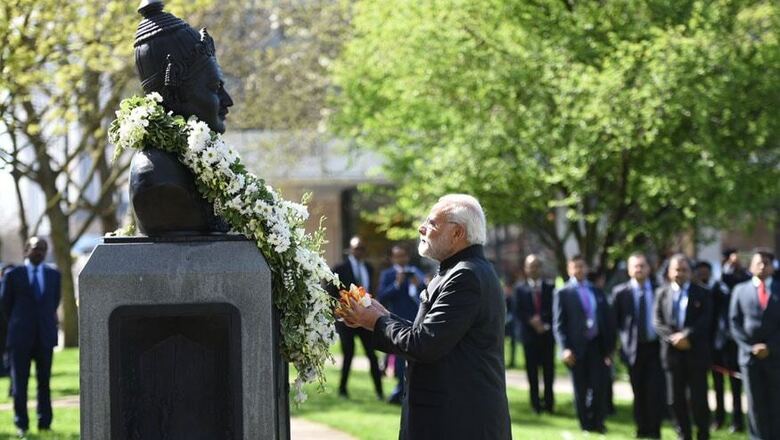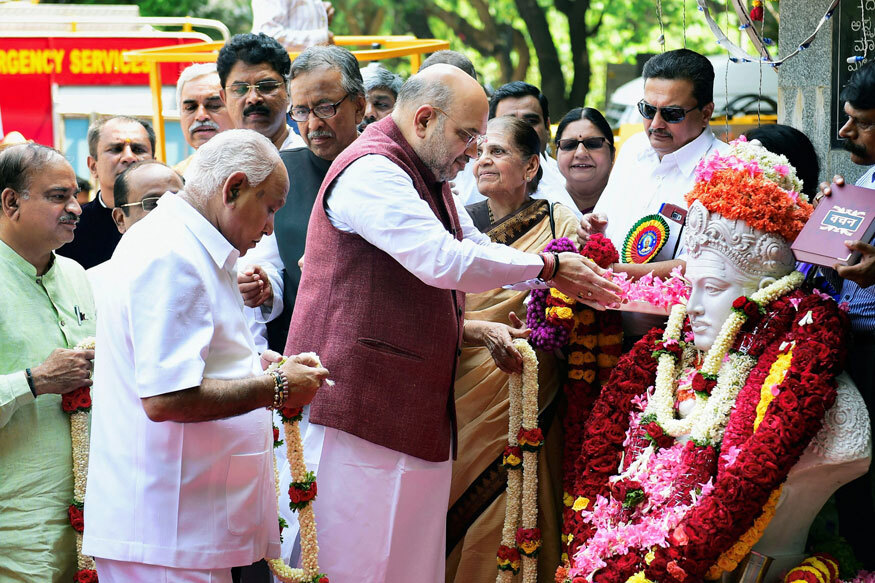
views
Bengaluru: Basaveshwara or Basavanna is the flavour of the season, from London to Lingasgur.
On the day of Basava Jayanthi, top leaders of the country, including Prime Minister Narendra Modi and Congress president Rahul Gandhi, competed against each other to greet people and garland the statue of the 12th century social reformer professing their faith in his preaching.
The Karnataka government’s decision to accord a separate religion tag to the Lingayats and BJP’s indecisiveness on the sensitive issue ahead of the crucial Assembly elections in Karnataka have brought the focus back on Basavanna who was largely confined to academic circles and public functions till recently.
In February, PM Modi made Basavanna a topic of national debate by invoking him in the Parliament to take on Jawaharlal Nehru and called Basaveshwara the real father of democracy in India.
The ruling Congress in Karnataka, which has been deftly playing the Lingayat card to break community votes mostly rooting for the BJP, wasted no time and hit back at the PM copiously quoting from Basavanna’s “Vachanas" or preaching.
After that, not a single day has passed in Karnataka without someone important invoking Basavanna for one thing or the other.
PM Modi, who is currently in London, spared time to garland a statue of Basaveshwara near the British Parliament on the banks of river Thames. Modi himself had unveiled the statue in mid-2015 during his visit to the United Kingdom.
Even though the organisers of the event claim that Modi paying respects to Basavanna on his birth anniversary has nothing to do with the Karnataka Assembly elections, one can barely miss the political symbolism it holds back home in Karnataka.
In Karnataka, the BJP MP Shobha Karandlaje had asked her party men not to allow Congress workers to garland the statues of Basaveshwara, in its protest against the ruling party’s “divisive" politics. But the police ensured that no untoward incident happened anywhere in the state.
BJP National President Amit Shah also garlanded a statue of Basavanna in Bengaluru while the party’s CM face, B S Yeddyurappa was also with him.

BJP National President Amit Shah offers tribute to Lord Basaveshwara on the occasion of Basava Jayanti in Bengaluru on Wednesday. Shah is in Karnataka on a two-day election campaign tour. (PTI photo)
The great social reformer whom many call “Kannadiga of the Millennium" has now become a tool in the hands of politicians, regret many of his followers. Commenting on appropriating Basavanna, renowned Kannada poet and playwright Professor H S Shivaprakash said that it was indeed a tragedy that Basavanna was being used as an election material by political parties to achieve their narrow goals.
Speaking to News18, he said, “There are two things. Because of Lingayat religion controversy, Basavanna has now become national news. People are showing interest in studying him. Media is debating him. His preaching is spreading. These are positive developments. But the negative thing is using him as a pawn for electoral gains. Basavanna is above all these mortal things. These politicians can’t reach that height or won’t be able to understand him."
Basavanna was born into an orthodox Brahmin family at Basavana Bagewadi in today's Bijapura district of Karnataka in 12th century. He was a highly respected minister at the court of King Bijjala of Kalyani Chalukyas who ruled most parts of north Karnataka. He revolted against the caste system in the Hinduism and founded a new religion called “Lingayats" to create a casteless society. His followers are known as Lingayats and they are the single largest “Hindu" caste/community after the Dalits in Karnataka today. Basava wrote profoundly meaningful poems called Vachanas in simple Kannada.
In Karnataka, politicians and commoners alike often quote his Vachanas to make a point. But national leaders of Congress and BJP invoking him all the time is something new. Reacting to this a powerful Lingayat woman seer Mathe Mahadevi said that if Basavanna reaches people even if the motive is purely political, she would be happy.
S M Jamadar, a retired IAS officer who is in the forefront of separate Lingayat religion movement claims that Basavanna’s preaching is exactly the opposite of BJP and RSS’ ideology. He says appropriating him for the votes is an insult to what he preached.
Many Basava followers are also upset with the Siddaramaiah government for using their spiritual leader’s name to take on the BJP.
Perhaps he had a vision that 800 years later he would be used like this that and Basavanna wrote, “Things standing (temples, shrines, buildings) shall fall, but the moving knowledge, (Jangama) ever shall stay."
BASAVANNA’S TENETS (From Basava Samithi)
1. There are no two or three gods. There is only one God, who is the Creator, Protector and Dissolver of this Universe.
2. This mortal world is the Creator’s Workshop and it is real.
3. Human life is very valuable. One should not harm one’s own body which is a means to attain God.
4. God is the supreme soul. He doesn’t come in to the cycle of birth and death. However great a human being is, he cannot be called ‘GOD’.
5. God is formless. We cannot feed him, clothe him. Needy man is the face of God. By serving living beings we can serve God.
6. The differentiation of caste, creed and race is not God-made, it is man-made.
7. He alone is holy who is blessed by God.
8. Do not suppress senses but sublimate them.
9. How can there be a religion devoid of compassion? Compassion should be at the root of religious faith.
10. Unless the pride of caste, class, race and sex is gone how one can be a devotee of God? One should forsake all traces of “I" and “mine".
11. To me all the lovers of God are one such is my faith. There is not the slightest doubt in me about this. There is no high born or low born for me.




















Comments
0 comment